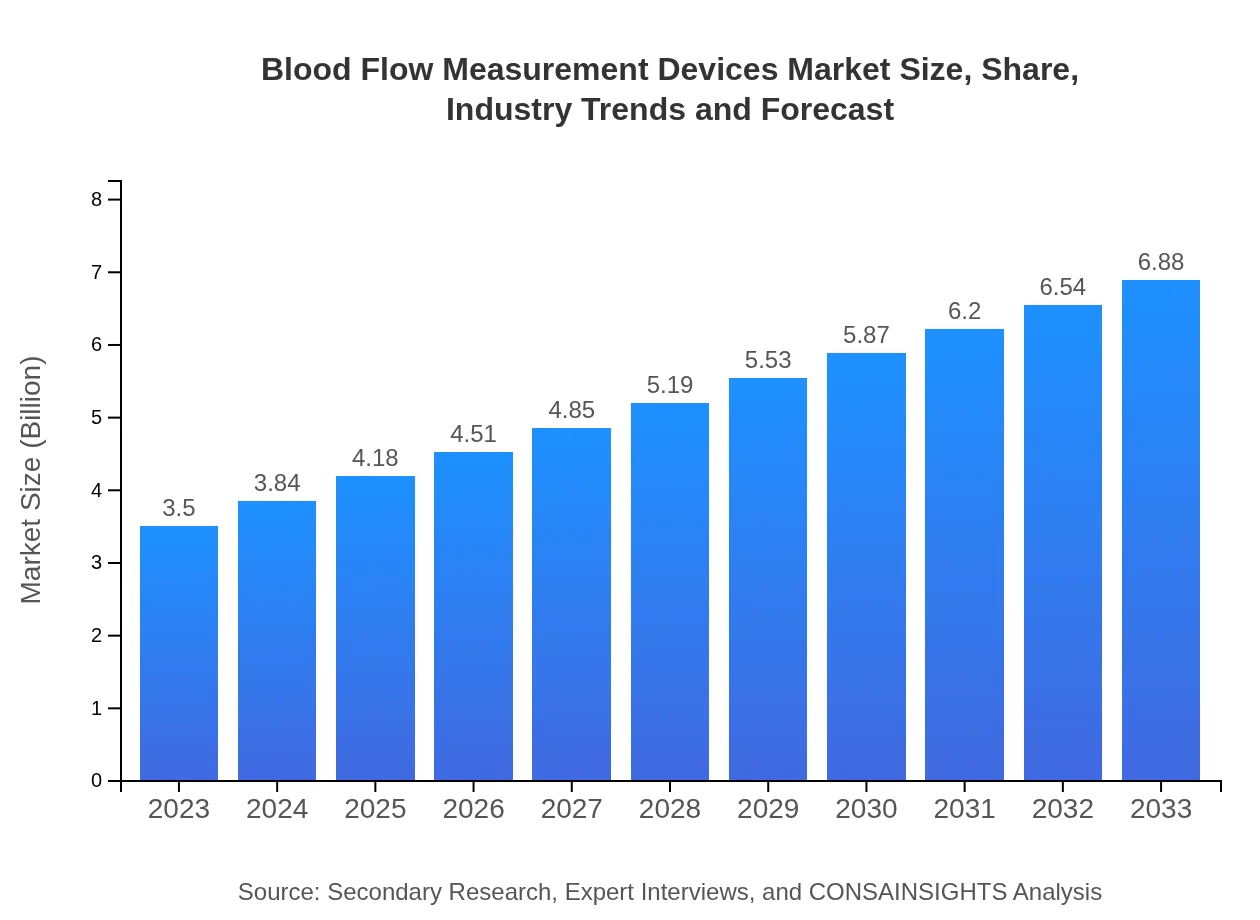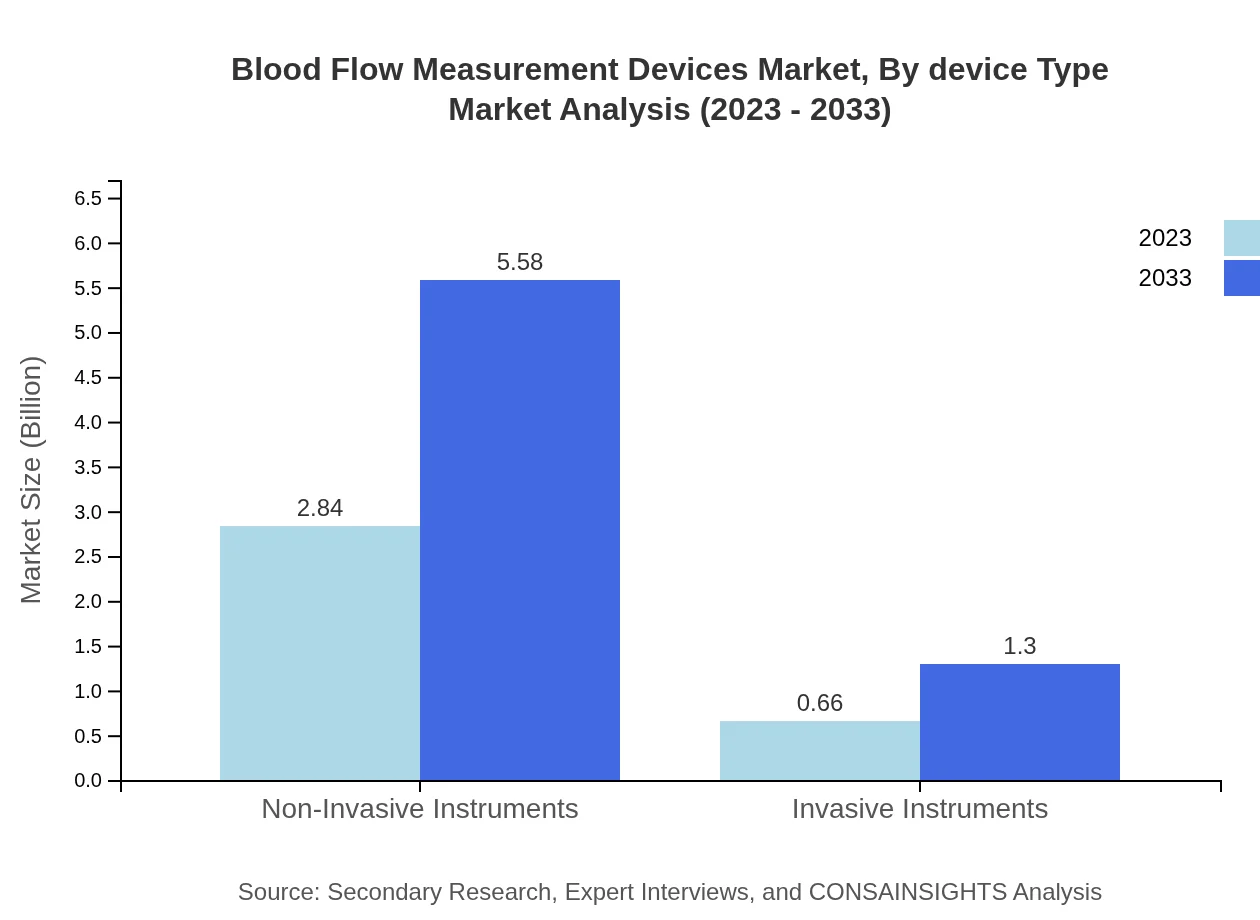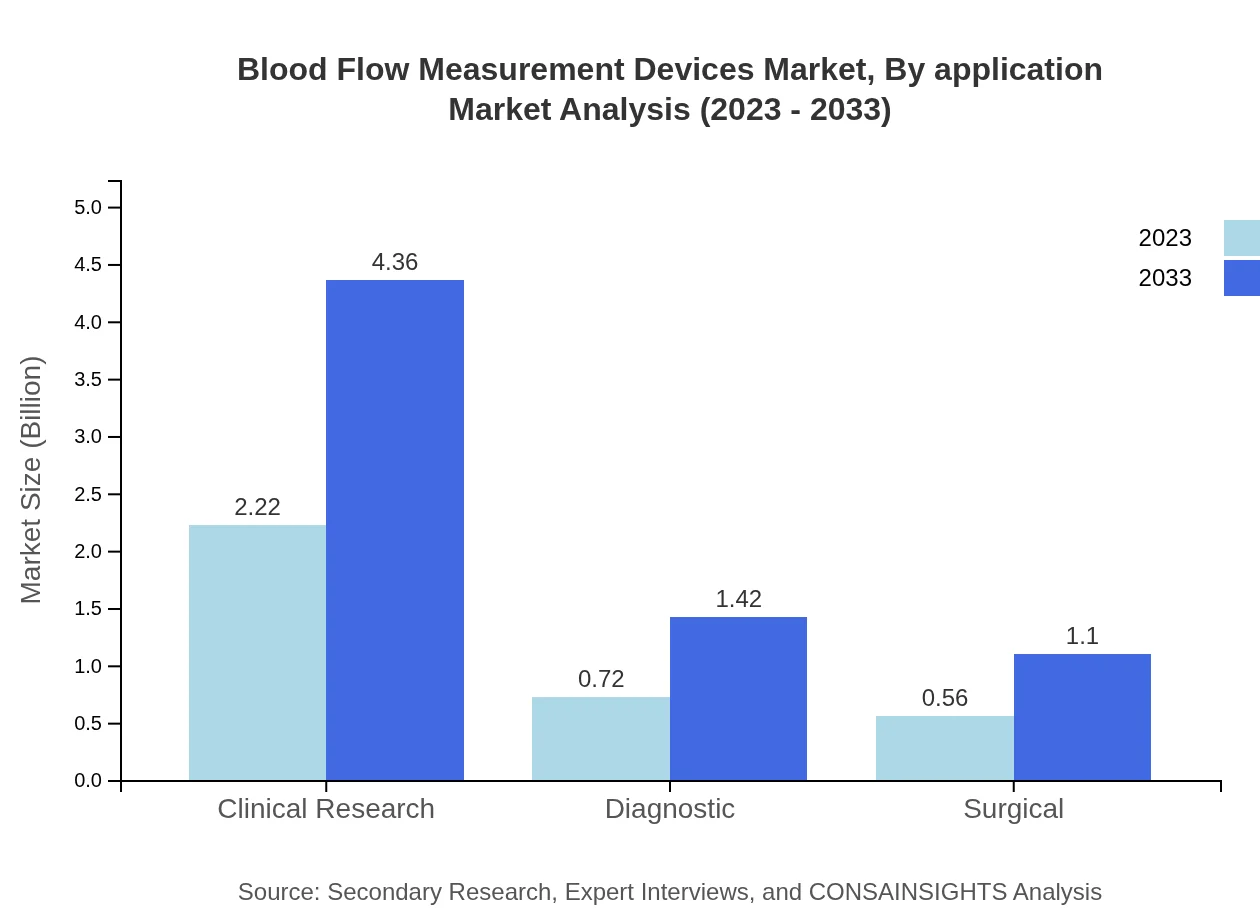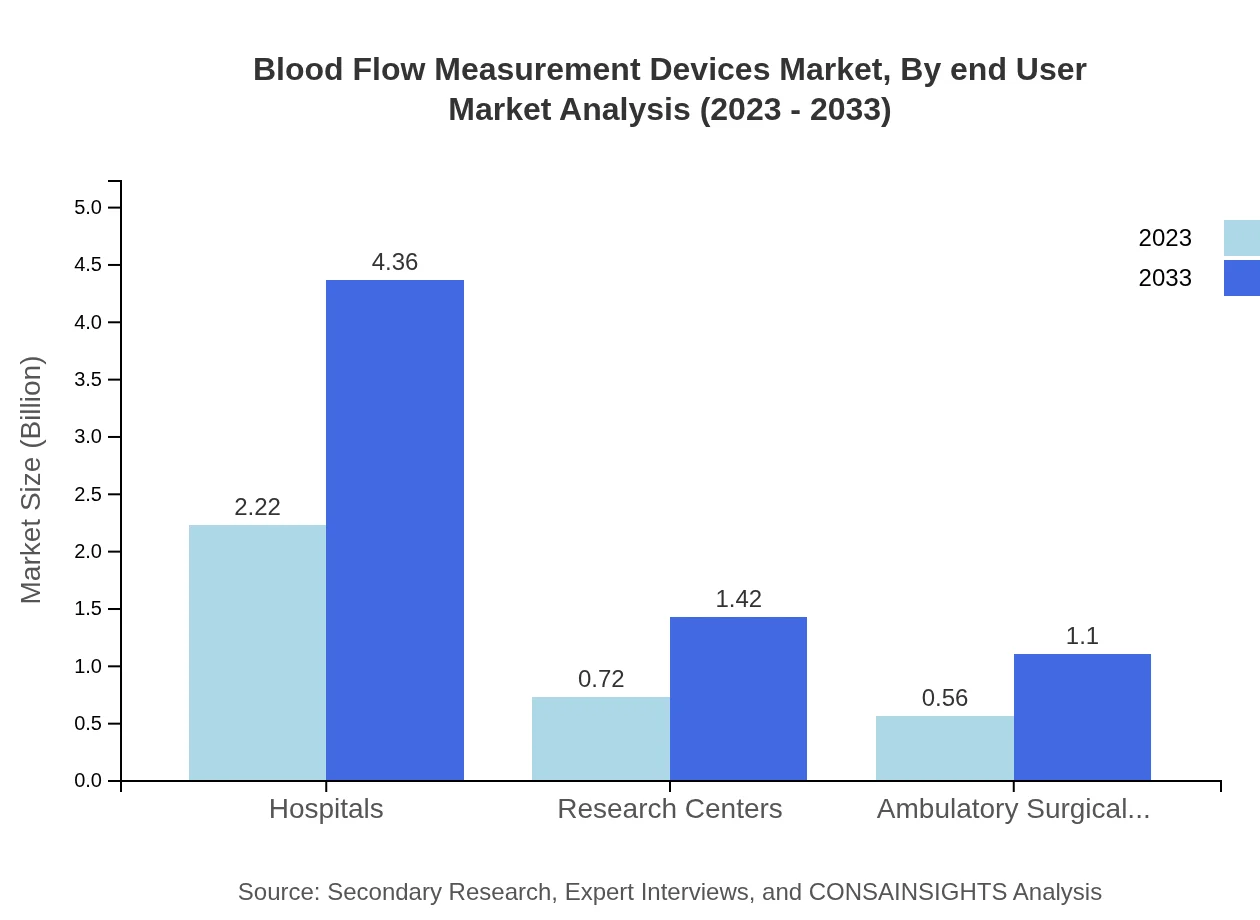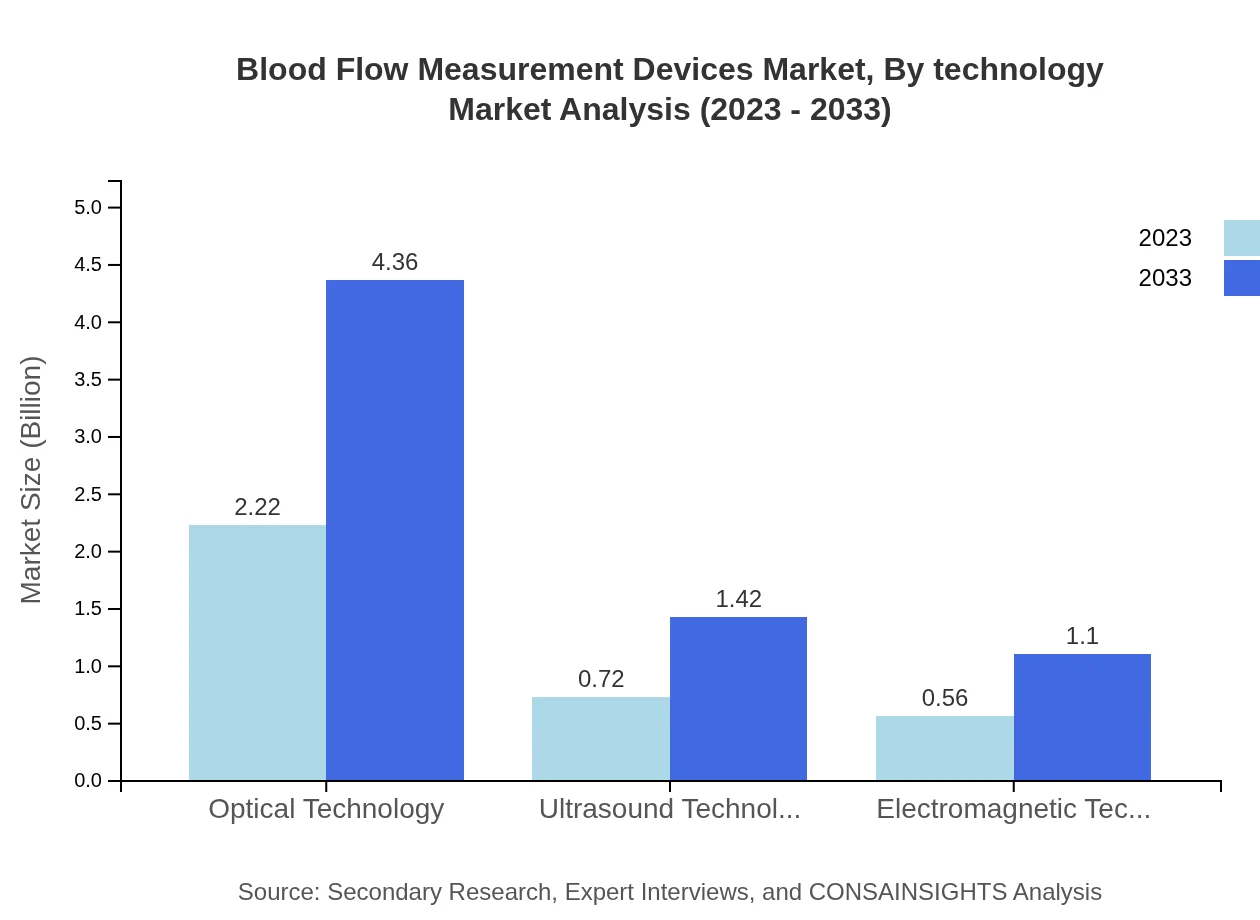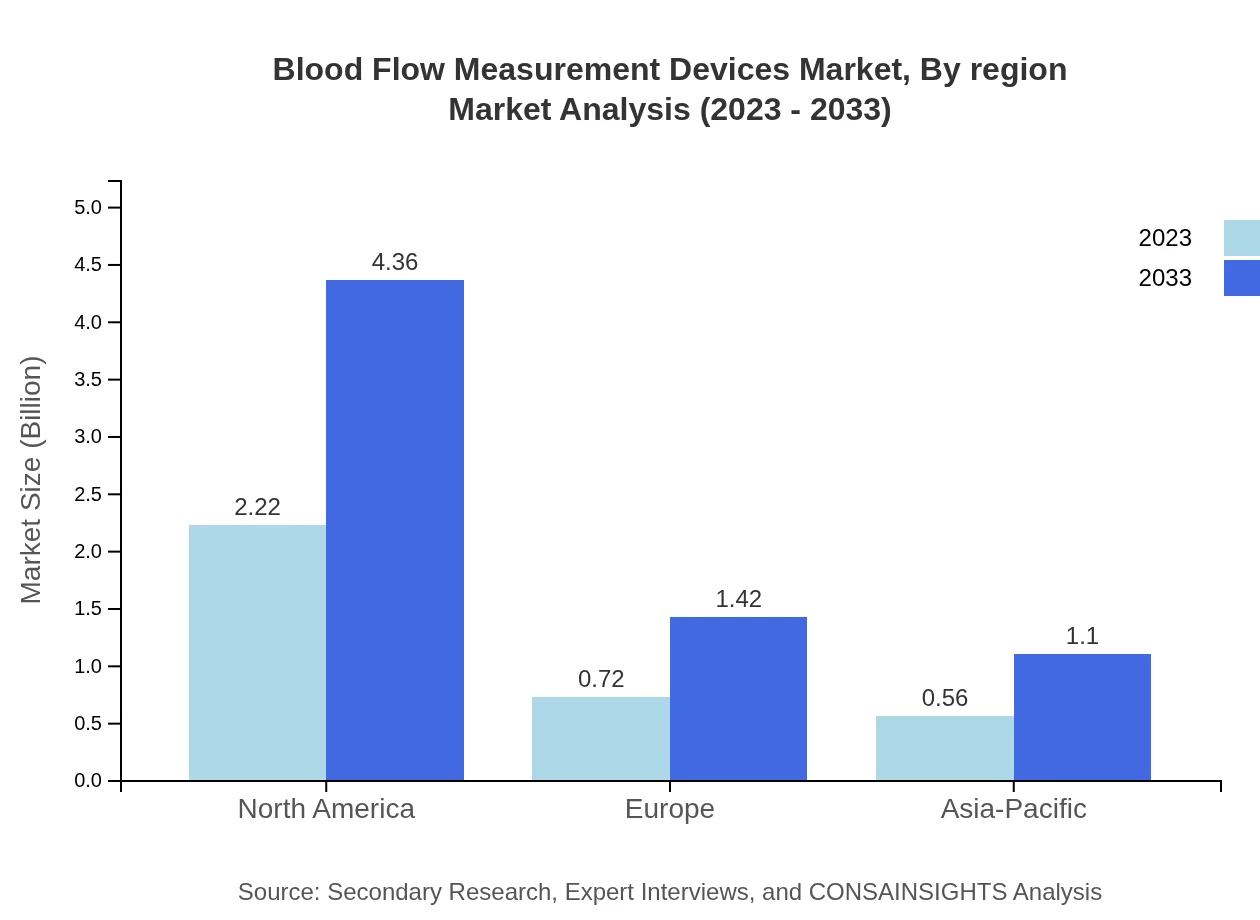Blood Flow Measurement Devices Market Report
Published Date: 31 January 2026 | Report Code: blood-flow-measurement-devices
Blood Flow Measurement Devices Market Size, Share, Industry Trends and Forecast to 2033
This report provides a comprehensive analysis of the Blood Flow Measurement Devices market from 2023 to 2033, focusing on market size, trends, segmentation, and regional insights. It aims to deliver valuable data and forecasts essential for stakeholders in the healthcare sector.
| Metric | Value |
|---|---|
| Study Period | 2023 - 2033 |
| 2023 Market Size | $3.50 Billion |
| CAGR (2023-2033) | 6.8% |
| 2033 Market Size | $6.88 Billion |
| Top Companies | Medtronic , Abbott Laboratories, GE Healthcare, Siemens Healthineers, Philips Healthcare |
| Last Modified Date | 31 January 2026 |
Blood Flow Measurement Devices Market Overview
Customize Blood Flow Measurement Devices Market Report market research report
- ✔ Get in-depth analysis of Blood Flow Measurement Devices market size, growth, and forecasts.
- ✔ Understand Blood Flow Measurement Devices's regional dynamics and industry-specific trends.
- ✔ Identify potential applications, end-user demand, and growth segments in Blood Flow Measurement Devices
What is the Market Size & CAGR of Blood Flow Measurement Devices market in 2023?
Blood Flow Measurement Devices Industry Analysis
Blood Flow Measurement Devices Market Segmentation and Scope
Tell us your focus area and get a customized research report.
Blood Flow Measurement Devices Market Analysis Report by Region
Europe Blood Flow Measurement Devices Market Report:
The European market for blood flow measurement devices is projected to increase from $1.02 billion in 2023 to $2.00 billion by 2033. Factors such as an aging population, a growing number of surgical procedures, and regulatory support for innovative medical devices contribute to this expansion.Asia Pacific Blood Flow Measurement Devices Market Report:
The Asia Pacific region exhibits robust growth, with the market expected to rise from $0.73 billion in 2023 to $1.44 billion by 2033, driven by increased healthcare investment and growing chronic disease prevalence. Countries like China and India are particularly witnessing rapid adoption of advanced healthcare technologies.North America Blood Flow Measurement Devices Market Report:
North America holds the largest market share, valued at $1.18 billion in 2023 and anticipated to reach $2.31 billion in 2033. The region's advanced healthcare infrastructure and consistent technological innovations in medical devices significantly drive this growth.South America Blood Flow Measurement Devices Market Report:
In South America, the market is projected to grow from $0.15 billion in 2023 to $0.29 billion by 2033. The growth is primarily fueled by improvements in healthcare infrastructure and a rise in cardiovascular incidents, leading to increased demand for blood flow measurement devices.Middle East & Africa Blood Flow Measurement Devices Market Report:
The Middle East and Africa, while comparatively smaller, shows promising growth from $0.43 billion in 2023 to $0.84 billion in 2033. Investments in healthcare and increased awareness of cardiac health are key drivers across the region.Tell us your focus area and get a customized research report.
Blood Flow Measurement Devices Market Analysis By Device Type
The Blood Flow Measurement Devices market comprises non-invasive and invasive instruments, with non-invasive instruments accounting for a significant market share due to their comfort and ease of use. In 2023, the non-invasive segment is valued at $2.84 billion, projected to rise to $5.58 billion by 2033, reflecting a substantial market share of 81.08%. Invasive instruments, while more accurate, represent 18.92% of the market, growing from $0.66 billion to $1.30 billion over the same period.
Blood Flow Measurement Devices Market Analysis By Application
The application segment highlights key areas like clinical research, diagnostics, and surgical procedures. Clinical research commands a dominant market position with a 63.34% share, seeing growth from $2.22 billion in 2023 to $4.36 billion by 2033. The diagnostics and surgical segments, while smaller at 20.6% and 16.06% market shares respectively, are also experiencing growth owing to increasing need for accurate assessments in medical procedures.
Blood Flow Measurement Devices Market Analysis By End User
Hospitals, research centers, and ambulatory surgical centers represent the primary end-users of blood flow measurement devices. Hospitals lead with a substantial 63.34% share, with the market size expanding from $2.22 billion in 2023 to $4.36 billion by 2033. Research centers follow at 20.6%, expecting growth from $0.72 billion to $1.42 billion in the same period, supported by the use of these devices in studies and research trials.
Blood Flow Measurement Devices Market Analysis By Technology
Technological advancements play a vital role in the Blood Flow Measurement Devices market, with optical technology leading the sector with a 63.34% share. This segment is expected to grow from $2.22 billion to $4.36 billion between 2023 and 2033. Other technologies, including ultrasound and electromagnetic, contribute to the overall market growth, with increasing innovations enhancing device accuracy and functionality.
Blood Flow Measurement Devices Market Analysis By Region
The regional segmentation reveals distinct growth patterns and potential. North America dominates with the largest share, while Asia Pacific shows the fastest growth rate due to improved healthcare access. Europe remains a strong market due to technological advancements. South America and the Middle East and Africa, though smaller, exhibit steady growth driven by healthcare improvements and increased awareness of circulatory health.
Blood Flow Measurement Devices Market Trends and Future Forecast
Tell us your focus area and get a customized research report.
Global Market Leaders and Top Companies in Blood Flow Measurement Devices Industry
Medtronic :
A global leader in medical technology, Medtronic specializes in innovative solutions for cardiac care including advanced blood flow measurement devices.Abbott Laboratories:
Abbott is a pioneering biotechnology company that provides medical devices and diagnostic solutions, known for its contributions to blood monitoring technologies.GE Healthcare:
GE Healthcare offers a range of advanced imaging and monitoring technologies, focusing on enhancing diagnostic precision in cardiovascular care.Siemens Healthineers:
Siemens Healthineers is committed to transforming healthcare delivery with innovative blood flow measurement and diagnostic tools.Philips Healthcare:
Philips focuses on health technology, providing various blood flow measurement devices that aim to improve patient outcomes.We're grateful to work with incredible clients.









FAQs
What is the market size of blood Flow Measurement Devices?
The global blood flow measurement devices market is valued at approximately $3.5 billion in 2023, with an expected CAGR of 6.8% over the next decade. This growth is driven by advancements in technology and increasing demand for effective diagnostic tools.
What are the key market players or companies in the blood Flow Measurement Devices industry?
Key players in the blood flow measurement devices market include major medical device manufacturers and specialized companies focusing on vascular technologies. These companies are implementing innovative solutions, contributing significantly to market advancement.
What are the primary factors driving the growth in the blood Flow Measurement Devices industry?
Growth in the blood flow measurement devices industry is primarily driven by rising prevalence of cardiovascular diseases, technological advancements, increasing healthcare expenditure, and a growing demand for non-invasive diagnostic procedures.
Which region is the fastest Growing in the blood Flow Measurement Devices?
The Asia Pacific region is witnessing rapid growth in the blood flow measurement devices market, projected to grow from $0.73 billion in 2023 to $1.44 billion by 2033, highlighting the region's increasing healthcare needs and technological advancements.
Does ConsaInsights provide customized market report data for the blood Flow Measurement Devices industry?
Yes, ConsaInsights offers customized market report data tailored to specific needs within the blood-flow-measurement-devices sector, ensuring clients receive insights relevant to their operational and strategic goals.
What deliverables can I expect from this blood Flow Measurement Devices market research project?
Deliverables from the blood flow measurement devices market research project include comprehensive reports, market analysis, trend identification, segmentation insights, and tailored recommendations for strategic decision-making.
What are the market trends of blood Flow Measurement Devices?
Current trends in the blood flow measurement devices market include increased adoption of non-invasive technologies, integration of AI and machine learning for diagnostic purposes, and a focus on patient-centric healthcare solutions.

